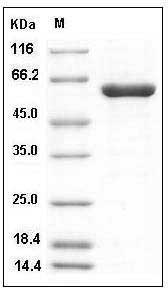-
Product Name
Human PTPN2/TC-PTP (aa 1-314, His & GST Tag) recombinant protein
- Documents
-
Description
Non-receptor type tyrosine-specific phosphatase that dephosphorylates receptor protein tyrosine kinases including INSR, EGFR, CSF1R, PDGFR. Also dephosphorylates non-receptor protein tyrosine kinases like JAK1, JAK2, JAK3, Src family kinases, STAT1, STAT3, STAT5A, STAT5B and STAT6 either in the nucleus or the cytoplasm. Negatively regulates numerous signaling pathways and biological processes like hematopoiesis, inflammatory response, cell proliferation and differentiation, and glucose homeostasis. Plays a multifaceted and important role in the development of the immune system. Functions in T-cell receptor signaling through dephosphorylation of FYN and LCK to control T-cells differentiation and activation. Dephosphorylates CSF1R, negatively regulating its downstream signaling and macrophage differentiation. Negatively regulates cytokine (IL2/interleukin-2 and interferon)-mediated signaling through dephosphorylation of the cytoplasmic kinases JAK1, JAK3 and their substrate STAT1, that propagate signaling downstream of the cytokine receptors. Also regulates the IL6/interleukin-6 and IL4/interleukin-4 cytokine signaling through dephosphorylation of STAT3 and STAT6 respectively. In addition to the immune system, it is involved in anchorage-dependent, negative regulation of EGF-stimulated cell growth. Activated by the integrin ITGA1/ITGB1, it dephosphorylates EGFR and negatively regulates EGF signaling. Dephosphorylates PDGFRB and negatively regulates platelet-derived growth factor receptor-beta signaling pathway and therefore cell proliferation. Negatively regulates tumor necrosis factor-mediated signaling downstream via MAPK through SRC dephosphorylation. May also regulate the hepatocyte growth factor receptor signaling pathway through dephosphorylation of the hepatocyte growth factor receptor MET. Plays also an important role in glucose homeostasis. For instance, negatively regulates the insulin receptor signaling pathway through the dephosphorylation of INSR and control gluconeogenesis and liver glucose production through negative regulation of the IL6 signaling pathways. Finally, it negatively regulates prolactin-mediated signaling pathway through dephosphorylation of STAT5A and STAT5B. May also bind DNA.
-
Protein name
Tyrosine-protein phosphatase non-receptor type 2
-
Protein short names
PTN2; PTPN2; TCPTP; TC-PTP; AI325124; TCELLPTP; PTPT
-
Uniprot ID
P17706
-
Gene Name
PTPN2; PTPT
-
Source/Expression Host
Baculovirus-Insect Cells
-
Expression Plasmid/cDNA
A DNA sequence encoding the amino acid (Met 1-Asn 314) of human PTPN2 (P17706-1) was fused with the N-terminal polyhistidine-tagged GST tag at the N-terminus.
-
Protein Species
Human
-
Molecular weight
The recombinant human PTPN2 (aa 1-314)/GST chimera consists of 551 amino acids and predicts a molecular mass of 64.4 kDa. It migrates as an approximately 60 kDa band in SDS-PAGE under reducing conditions.
-
Purity
> 95 % as determined by SDS-PAGE
-
Activity
Measured by its ability to dephosphorylate a phosphotyrosine residue in an EGF receptor 988-998 phosphopeptide substrate, R&D Systems, Catalog # ES006.
The specific activity is > 30 nmoles/min/μg. -
Validations

Human PTPN2 / TC-PTP Protein (aa 1-314, His & GST Tag) SDS-PAGE
Related Products / Services
Please note: All products are "FOR RESEARCH USE ONLY AND ARE NOT INTENDED FOR DIAGNOSTIC OR THERAPEUTIC USE"
